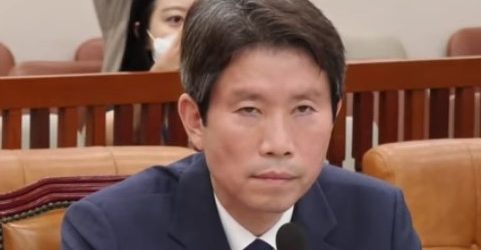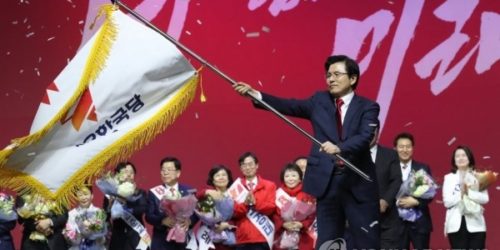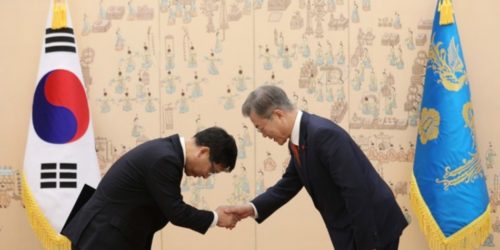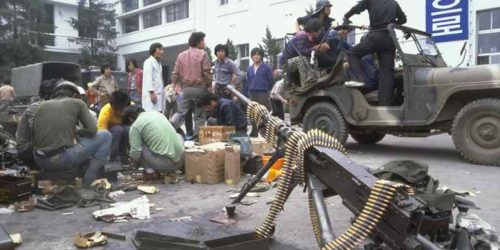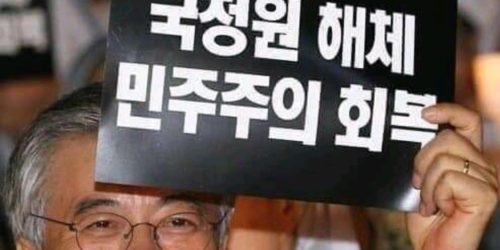Moon Jae-in Government’s Daydream for “Peaceful Unification through Conversation”
January 25, 2022, Lee Chul-young, columnist [Translation]
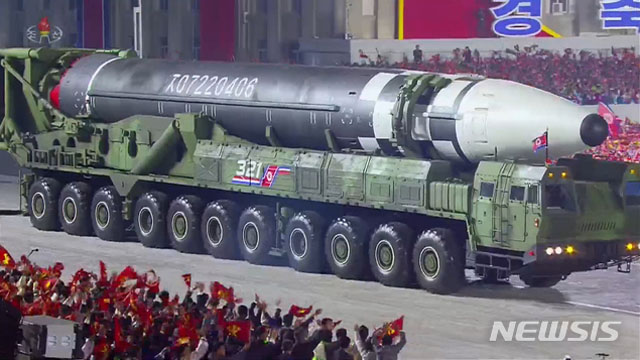
The South Korean government’s five-year daydream of “Peace Show,” so-called the “Korean Peninsula Peace Process,” is likely to end in vain. By the time good memories of several “South-North Summit Talks” including the showy visit to the top of the Baekdu Mountain by the couples of Moon Jae-in and Kim Jong-un, and of the summit meetings between president Trump and North Korean leader Kim Jong-un, the Moon government’s fantasy and flattering policy towards North Korea lost ground when Kim Jong-un threatened to resume ICBM launch and nuclear tests.
During his trip to the Middle East, President Moon criticized Yemeni rebel’s drone attack in the United Arab Emirates (UAE) as “an act that threatens peace and stability in the Middle East,” and strongly condemned the rebels for the capture of a civilian UAE ship on January 18. His accusation was timely and quite natural, but it sounded embarrassing to the South Korean people.
North Korea launched missiles four times from the beginning of this year. Even though South Korea would be helpless, if North Korea is to fire what it calls hypersonic missiles at targets in South Korea, Moon government has been only repeating “conversations,” while refraining from protesting North Korea’s successive missile launches as “provocation.”
North Korea’s threats to resume nuclear tests and ICBM launches in addition to the recent missile launches this year
At the time of the first missile launch by North Korea, President Moon said “We should not let go of the conversation.” After the second missile launch, Moon’s only concern was the adverse impact on the ruling party candidate in the presidential election in March, instead of worrying about national security. After North Korea’s fourth launch during Moon’s overseas trip, he instructed, “Please make every effort to manage the situation on the Korean Peninsula on the initiative of the Director of National Security Office.” It is no better than ordering the bank’s security officer to stably deal with the situation through dialogue while the bank was being taken over by an armed robbery.
Six countries, including the US and the UK, issued a “condemn” statement on North Korea’s consecutive launch of new hypersonic missiles, but South Korea, despite the fact that North Korean hypersonic missiles will neutralize the US-South Korea defense system, stayed away from such denouncement. After North Korea’s fourth launch, when the UN Security Council convened again (January 20), North Korea threatened to resume nuclear tests and ICBM launch saying it will “reconsider all the trust-building measures towards the U.S. and restart all activities that have been temporarily stopped.”
During the UN Security Council meeting on 20 January, additional sanctions against North Korea as well as the adoption of statements failed due to the restraint of China and Russia. As a result, eight countries, including the US and Japan, have urged additional sanctions against North Korea in a separate statement, but South Korea again has been silent all the while only calling for “talk” with North Korea. Over the past five years, clearly knowing the North Korea’s intention to lift all sanctions against them while making nuclear possession a fait accompli, the South Korean government has repeated only “end-of-war declaration” and “peaceful unification” like a parrot.
“End-of-war declaration” and “peaceful unification”
The Cold War ended with the dissolution of the Berlin Wall in November 1989 and the Malta Declaration between the United States and USSR in December, followed by the dissolution of the USSR in December 1991 and adoption of a socialist market economic system in China in 1992. Apart from these movements to end the Cold War, however, North Korea has only solidified a more aggressive dictatorship, including the development of nuclear warheads and ballistic missiles under the hereditary autocracy of the Kim Il-sung family.
The Kim Dae-jung government of South Korea (1998~2003) sought to reform and open North Korea, while easing tensions between the two Koreas with the so-called “Sunshine Policy.” But the “Sunshine Policy” eventually resulted in giving North Korea time and funds to develop nuclear weapons. In a New Year press conference in 2014, former President Park Geun-hye said, “Unification is a jackpot” and “an opportunity for a huge leap forward.” While traveling to the U.S., President Moon Jae-in said “People who called for ‘unification is a jackpot’ are now opposing unification, after the regime changed in South Korea” in an interview with Fox News on September 25, 2018,
President Moon’s remarks imply that right-wing camp in South Korea opposes “peaceful unification,” but, in fact, even when former President Park said “unification is a jackpot,” many people, regardless whether they are on the left or right, were skeptical, citing the current situation on the Korean Peninsula or the burden of unification costs. In order for unification to become a “jackpot,” a peaceful unification without war is a prerequisite, not unification in ruins through war. However, in the current situation where North Korea is openly threatening with nuclear weapons, South Korea’s slogan of “end-of-war declaration” or “peaceful unification” is a fiction that is not feasible, just as the name of the world’s most undemocratic hereditary dictatorship is “Chosun Democratic People’s Republic” [direct translation of Democratic People’s Republic of Korea].
Is peace achieved when you wish strongly?
During his visit to Egypt, President Moon said, “Considering the current situation, it does not seem easy to build peace.” He further said, “Peace will come true when we strongly wish for it.” If that is the case, then is peace not achieved in Korean Peninsula, just because Koreans do not wish for peace?
In the 4th century, Roman military author Publius Flavius Vegetius Renatus said, “In time of peace, prepare for war.” Since then, philosopher and historian Machiavelli, President George Washington, and President J. F. Kennedy have made the same argument. It is only an illusion to believe that dialogue and negotiations between those with and without nuclear weapons will bring equal benefits to both sides. Will shareholders and the management of a company, who have been on the sidelines until hostile investors who covet management rights acquire a majority share, be able to protect management rights only through dialogue?
How many people would believe that South Korea can achieve a peaceful unification embracing North Korea, when the current South Korean administration fails to even bring up the word “provocation” in fear of North Korean protests, and not even receive a proper “apology,” but rather, barely getting a sign of “regret?” That’s why people assert that unification is not a “jackpot,” but a “chaos” or “going bust.”
We have to face the North Korean nuclear weapons with the power of “alliance”
Napoleon said, “You must not fight too much with one enemy, or you will teach him all your art of war.” North Korea sees through South Korea’s policy toward it over the past 20 years. The South Korea-North Korea Summits since 2000 have only had the meaning of “getting-together,” failing to make any further progress. South Korea’s economic aid to North Korea for the cost of “conversation” eventually resulted in giving North Korea time and funds for nuclear development, promoting conflict on the Korean Peninsula, and prosperity of North Korea’s hereditary system.
Kim Jong-un will not give up on nuclear weapons, a lifeline vital to his power, unless his life is at stake. Despite President Moon’s one-sided hope for “conversation,” North Korea has fired more than 50 missiles over 30 times of provocations since the Moon government began. It is a tremendous number of provocations compared to the 19 missiles in 12 provocations during the Lee Myung-bak administration and 8 missiles in 5 provocations during the 3 years of the Park Geun-hye government. Nevertheless, the Moon government made itself the laughingstock of the international community by alleging that Kim Jong-un has a “will to denuclearize” and, thus, by fooling the U.S. President, Donald Trump into meeting the hostile young dictator.
North Korea has been provoking with nuclear tests and missile launches whenever they plan to throw tantrums at the U.S. and just before the elections in the US and South Korea. This year, there are presidential and local elections in Korea in March and June and US midterm elections in November. Under the current circumstances, the North’s threat of “resumption of nuclear tests and ICBM launches” is not likely to end in empty words. The Moon government’s five-year old one-sided daydream of “end-of-war declaration” and “peaceful unification” are ending in an empty dream.
The conflict between South Korea and North Korea is not just a problem within the Korean Peninsula only, but a concern of regions and political camps. It is also important for South Korea to have military power to respond to nuclear weapons in North Korea, but South Korea has no choice but to respond to Kim Jong-un regime with the united power of an “alliance.” Who is the true friend and “ally” to South Korea?
https://www.newdaily.co.kr/site/data/html/2022/01/25/2022012500207.html
